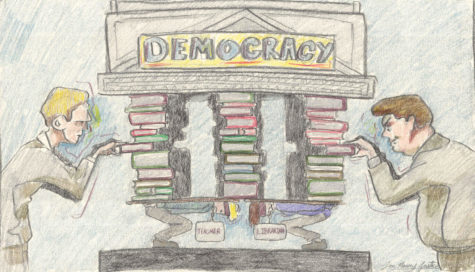State governments deeming certain businesses “nonessential” leads to confusion
Ridley’s employees wear protective face masks behind a panel of plexiglass to promote customer safety during the coronavirus pandemic.
As of April 3, 46 states and Washington D.C. have ordered the closure of all “nonessential” businesses amid the coronavirus outbreak in the United States. While specifics and guidance varies from state to state, most recreational spaces like daycares, movie theaters, gyms, and malls, as well as self-care facilities like spas and nail and hair salons, usually fall under this overarching “nonessential” business category. As a result of this clear demonstration of government overreach, millions of working Americans are now unemployed, and small business owners are struggling to stay afloat.
While it is understandable that the federal and state governments are encouraging social distancing and self-quarantine in order to “flatten the curve” and to prevent hospitals from becoming overwhelmed with COVID-19 patients, it still amazes me how willing we are to allow mostly the state governments to determine which businesses are essential and which are not. In a free market system, every business is essential to the person who owns it and their employees. But in our current situation and the foreseeable future, a business is only essential if the government says it is.
As can be expected, however, there have been some discrepancies which businesses are essential and which are not. For example, in March, several local governments in the Bay Area of northern California deemed gun stores as “nonessential” businesses and ordered their closure until further notice. Unsurprisingly, several local residents and gun-rights organizations, including the National Rifle Association, filed a federal lawsuit against several Bay Area government officials demanding that all gun stores be allowed to reopen immediately. “California’s local governments cannot simply suspend the Constitution … authorities may not, by decree or otherwise, enact and/or enforce a suspension or deprivation of constitutional liberties,” the suit reads. “And they certainly may not use a public health crisis as political cover to impose bans and restrictions on rights they do not like.” The state of California does, however, consider marijuana dispensaries as “essential” businesses.
Another hot-button type of business that has come under fire because of the coronavirus pandemic are abortion providers led by Planned Parenthood. On March 17, Ohio Governor Mark Dewine ordered the end to all elective surgeries that use personal protective equipment required to help fight COVID-19, and several other states have implemented similar measures since. “If abortion is a ‘choice,’ then abortion is an elective procedure,” said Mark Harrington, President and founder of Created Equal, an Ohio-based anti-abortion group. “In a clear double standard, abortion centers across the nation are staying open during this national health crisis, risking public health and safety.” Yet while cancer screenings, mammograms, and even prenatal appointments have fallen under the guise of “nonessential” healthcare, the abortion industry has refused to close its doors. So, not only is the abortion industry still targeting, profiting from, and exploiting mothers in difficult circumstances, but it is also diverting crucial medical resources and supplies from the battle against the coronavirus.
Closer to home, hundreds of small businesses in Sheridan, Wyo. that have been declared “nonessential” by Gov. Mark Gordon are now seeking federal disaster loans from the Small Business Administration. “The impacts are going to be substantial throughout the community,” said Sheridan County Chamber of Commerce CEO Dixie Johnson. Johnson has also mentioned that several business owners have reached out to the Chamber for more information but that she does not have any answers. As of now, many businesses in the Sheridan area and across the state are still in the information gathering and decision-making stages of closures and how best to address employee and long-term economic impacts.










